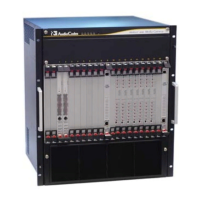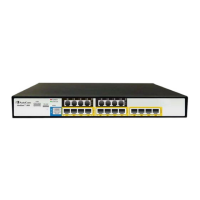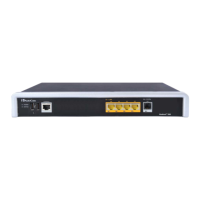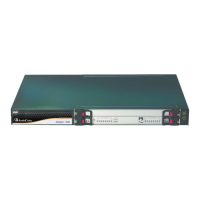User's Manual 444 Document #: LTRT-10632
Mediant 800B Gateway & E-SBC
Parameter Description
[IPProfile_SBCGenerateRTP
]
incoming packets before sending RTP (e.g., early media used for
ringback tone or IVR) during media negotiation.
[0] None (Default) = Silence packets are not generated.
[1] Until RTP Detected = The device generates silence RTP
packets to the SIP entity upon receipt of a SIP response (183 with
SDP) from the SIP entity. In other words, these packets serve as
the first incoming packets for the SIP entity. The device stops
sending silence packets when it receives RTP packets from the
peer side (which it then forwards to the SIP entity).
Note: To generate silence packets, DSP resources are required
(except for calls using the G.711 coder).
SBC Media
Transcoding Mode
transcoding-mode
[IpProfile_TranscodingMode]
Defines the transcoding mode (media negotiation) for the SIP entity
associated with the IP Profile.
[0] Only if Required = (Default) Transcoding is done only when
necessary. Many of the media settings (such as gain control) are
not implemented on the voice stream. The device forwards RTP
packets transparently (RTP-to-RTP), without processing them.
[1] Force = Transcoding is always done on the outgoing leg. The
device interworks the media for the SIP entity (as both legs have
different media capabilities), by implementing DSP transcoding.
This enables the device to receive capabilities that are not
negotiated between the SIP entities. For example, it can enforce
gain control to use voice transcoding even though both legs have
negotiated without the device's intervention (such as extension
coders).
For more information on extension coders and transcoding, see Coder
Transcoding on page 673,
Note:
To implement transcoding, you must configure the number of
required DSP channels for transcoding (using the MediaChannels
parameter). Each transcoding session uses two DSP resources.
The corresponding global parameter is TranscodingMode.
Extension Coders Group
sbc-ext-coders-group-name
[IpProfile_SBCExtensionCod
ersGroupName]
Assigns a Coder Group used for extension coders, added to the SDP
offer in the outgoing leg for the SIP entity associated with the IP
Profile. This is used when transcoding is required between two IP
entities (i.e., the SDP answer from one doesn’t include any coder
included in the offer previously sent by the other).
For more information on extension coders and transcoding, see Coder
Transcoding on page 673,
To configure Coder Groups, see Configuring Coder Groups on page
427.
Allowed Audio Coders
allowed-audio-coders-group-
name
[IpProfile_SBCAllowedAudio
CodersGroupName]
Assigns an Allowed Audio Coders Group, which defines audio (voice)
coders that can be used for the SIP entity associated with the IP
Profile.
To configure Allowed Audio Coders Groups, see Configuring Allowed
Audio Coder Groups on page 432. For a description of the Allowed
Coders feature, see 'Restricting Coders' on page 672.
Allowed Coders Mode
sbc-allowed-coders-mode
Defines the mode of the Allowed Coders feature for the SIP entity
associated with the IP Profile.

